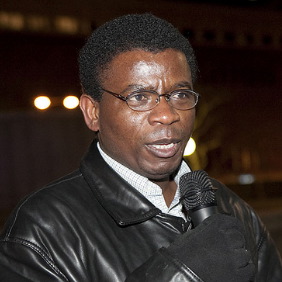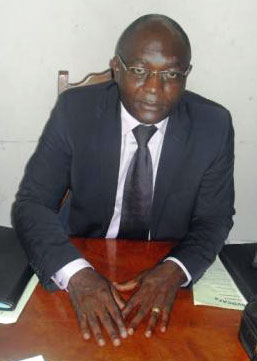Brave defenders of LGBT Africans need support
Colin Stewart is a 45-year journalism veteran living in Southern…
Courageous attorneys who defend victimized LGBT people in Africa deserve our support and our blessings, the Rev. Canon Albert Ogle writes in this column, which originally appeared in the San Diego Gay & Lesbian News.
One way they can be supported is through an Indiegogo campaign on behalf of activists who are taking aim at the root causes of homophobia in Cameroon. “We hope this story helps to improve our communication of … where we might make a small difference,” Ogle writes.
RGOD2: The power of two
Lessons of redemption for the legal profession

There are 2,000 attorneys licensed to practice law in Cameroon. Only two of them are courageous enough to give legal representation to LGBT people in a country that has been rated poorly on its human rights record.
Cameroon’s government faced several difficult sessions last year at the United Nations in Geneva and in the Gambia during the meeting of the African Union’s leading human rights watchdog organization (The African Commission on People’s and Human Rights).
The country remains personally and professionally dangerous for human rights, legal advocates and religious leaders to give support to the LGBT community in Cameroon. I spent Monday evening talking with one of these two exceptional attorneys, Michel Togué, and finding out how his work and legal practice has been shaped by these challenging contexts.

Alice Nkom is the other attorney whose advocacy for LGBT people was recently recognized through an award from the German branch of Amnesty International. Between Alice and Michel, these two straight allies represent the prophetic and redemptive side of the Cameroonian legal profession. As countries like Uganda and Nigeria establish the legal framework where LGBT people can be routinely arrested, interrogated, tried and imprisoned, Alice and Michel represent an under-utilized resource that the African and international community has largely ignored – the actual real-life stories and plight of the incarcerated themselves.
When we think about where media and advocacy attention has focused in recent years, it has largely been on legislative and constitutional issues in many countries where it is illegal to be LGBT, without spending a lot of time and resources on the effects of the attitudes and legislation – namely details of what actually happens to LGBT people in jail.

The Rev. Kapya Kaoma — whose groundbreaking research uncovered the significant role of American religious organizations, often funded with public and charitable donations, leading anti-gay campaigns in many of these countries — believes this omission is a serious flaw in a more strategic process to rid the world of homophobia.
“It is now normal in places like Zambia and Zimbabwe to lock LGBT people up for years, often without due process, simply for being LGBT. They are not criminals, yet to be sent to an African prison where they remain anonymous statistics, radically changes the path of a normal life and any time in prison can kill them or shorten their lives.”
Kaoma is appalled at the inhumanity of the simple reality of knowing that thousands of LGBT people are incarcerated simply for being the way God has made them to be. Their stories need to be told, and religious and political leaders who have perhaps been strongly advocating for anti-gay legislation, need to see and understand for themselves, the dire implications their work is having on real human lives. Without their stories, we are all anesthetized from the sheer tragedy of all of this.
A contemporary hero
Michel Togué is someone who knows this tragedy from personal and professional experience:
“I currently have 10 clients in prison in Cameroon and some of them are in jail for no reason. Two young men were arrested in a bar after a heavy drinking bout, and when it was discovered they were gay, the government prosecuted them and they are now in jail. These young men did not do anything wrong, yet there are many people like this who are arbitrarily arrested and imprisoned.”
Michel was in a particularly reflective mood when we had dinner in Washington, D.C., with Eileen Blumenthal, who also serves on St. Paul’s Foundation. One of his clients was Roger Mbede, who died in Cameroon last weekend. He was only 34 years old and had spent 16 months in prison for sending a text to another man telling him he loved him.
Roger’s life and reputation were destroyed by the legal system in Cameroon and reinforced by the religious and cultural traditions that underpin these laws. Colin Stewart is one of the few American journalists who is constantly reporting on these horrific arrests and the actual effects incarceration (often without trial or due process) for people like Roger and several LGBT people in Zambia. Mainstream press has not covered any of these stories in the way that has been helpful to the global LGBT movement. It is only when someone finally dies, as with Roger’s death last week, then a fringe story may get some media attention.
What factors caused Roger’s premature death?
Colin’s latest report from Cameroon shares some information on the potentially negative role of Roger’s family, who isolated him from the community and even medical care because they believed his sexual orientation to be a result of evil witchcraft. The family stigma was so strong that it was simpler for Roger to die at 34 than to engage the issues that LGBT people are created that way and are a hidden part of African society.
Prison, or by simply making it impossible to provide HIV prevention or health services, is a further extension of the “gay final solution” – or as David Bahati would say: “The wages of sin is death” — basically describing the slow genocidal process whereby if governments cannot execute LGBT people, there are other ways to ensure their early demise.
We owe a tremendous debt to people like Michel for risking his life and professional career while refusing to believe in this inhumanity and cruelty, and continue to offer LGBT people their services with the dignity and legal rights of their citizenship. Yet, why does Michel not have more support for his work from the legal and progressive communities in the USA or Europe?
Death threats

As a result of constant death threats, Michel moved his family – his wife and four children — to the USA. He continues to work remotely from the USA and continues to visit his clients in prison and represent them in Cameroon’s courts. It would be wonderful to see some of the larger DC law partnerships, noted for their leadership in international human rights issues, to reach out and support Michel, his family and other initiatives to raise the profile of the LGBT incarcerated.
Wouldn’t it be an enormous resource for any East Coast law school to engage Michel to teach international human rights law to the next generation of attorneys? How else can we ensure there will be more than two attorneys out of 2,000 to represent LGBT people in places like Cameroon?
Michel expressed interest to us in studying in a local program on international human rights law and was exploring how he might find the financial resources to do it, but people like Michel should be teaching and designing these courses for the next generations.
This still largely hidden problem is not going to disappear anytime soon and it is disturbing to see a growing international preoccupation with spying on each other. Recent legislation in Russia, Uganda and Nigeria is based on neighborhood spying on each other and reporting on suspected LGBT people and their organizations. The legal and human rights implications of everything from international cyber spying to the random round-up of LGBT people and shutting down organizations who support them (or the illegality to offer them health services) should be of major concern to all our major law schools. But we are not yet seeing an institutional response on the magnitude needed to mitigate more contexts like Zambia’s or Cameroon’s.
Solidarity with Cameroon
I am not an attorney, but one of the ways we can help Cameroon and the heroic work of leaders like Alice and Michel is to be invited to bring our own professional expertise and network to help our Cameroonian friends who are already doing wonderful work there.
In early February, St. Paul’s Foundation has been invited by CAMFAIDS to sponsor four people to attend the African Sexual and Reproductive Rights Conference in Cameroon, with a view to sharing our experience and building some alliances between the LGBT and other issues.
Maxensia Nakibuuka’s conference abstract (as well as mine) has been accepted for presentation at the conference, so we will be there. We also hope to meet with the NGO community and representatives of the churches to talk about how they can help provide more inclusive services. It is often in these small ways and more intimate conversations that we build relationships that help to heal the gross inhumanity that institutions can give permission to unleash on the most marginal and vulnerable.
We are still looking for financial support from people who cannot show up personally to support Michel and his clients, but can afford to write and check to ensure Maxensia and I can engage with the community there. An online donation to our online Indiegogo campaign is one way we can show solidarity to this largely forgotten community and a way to say: “You are not alone and someone cares.” The campaign has been live for a week now and we have raised less than $400. Clearly, our supporters are still struggling with why this particular mission is important. We hope this story helps to improve our communication of what is happening in many countries all over the world and where we might make a small difference. As long as people like Michel and Maxensia show up, others need to show up with them.
Africans and international partners can work together. Michel and his newly exiled family also need more than monetary support – they need a community reaching out and giving them the admiration and respect that few of our American families will ever need or deserve. I do not know many clergy or attorney families who need to move to another country simply for doing their professional work as best they can do.
Richard Bolles is the author of “What Color is Your Parachute” and is also an Episcopal priest. Long ago, he shared a valuable mantra that has guided all of my work for LGBT rights and inclusion: “There are not many heroes in the church these days, so when you find one, you bless them.” The same thing could be said about the legal profession and when we see the kind of work Alice Nkom and Michel Togué are doing within their own professions, we all need to bless them also.




